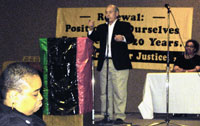Black/Latin@ unity stressed at labor banquet
By
Monica Moorehead
Raleigh, N.C.
Published Apr 6, 2006 9:01 PM
Black Workers for
Justice held its 23rd annual Dr. Martin Luther King Jr. Support for Labor
Banquet April 1 in Raleigh, N.C. BWFJ was also commemorating its 25 years of
community, workplace and anti-imperialist organizing. The major theme of the
banquet was “No to war, repression, racism... yes to peace, justice,
reparations, human and workers rights.”
|
Baldemar Velasques, Farm Labor
Organizing Committee, April 1.
At left is BWFJ leader Ashaki Binta.
WW photo: Monica Moorehead
|
BWFJ has a tradition of
holding its banquet on the first Saturday in April to honor the memory of Dr.
King, who was assassinated on April 4, 1968. King was not only a champion of
civil rights but was an outspoken opponent of the Vietnam war and a proponent
for workers’ rights. He was killed in Memphis, Tenn. while supporting
striking sanitation workers, mainly Black men, who were struggling for a living
wage, better working conditions and dignity.
A majority of the 300 or more
people who attended the banquet were labor, com munity and political organizers,
mainly from the South but from other regions of the country as well. BWFJ has a
close working relationship with UE Locals 150 and 160 that are carrying out
organizing drives to sign up hundreds of thousands of public-sector workers into
unions through out North Carolina, a “right to work” state. North
Carolina ranks 50th as the state with the lowest number of unionized workers.
BWFJ’s National vice-chair, Angaza Sababa Laughinghouse, stated in
his welcoming remarks that the organization’s goal has been to build
class-wide unity especially among African American, Latin@, Indigenous, women
and white workers. The banquet was emceed by Nathanette Mayo.
BWFJ has had
a close working relationship with the Farm Labor Organizing Com mittee that
represents the interests of 8,000 migrant workers in North Carolina, who won
their first union contract last year. The national president of FLOC, Bald emar
Velasquez, traveled from Toledo, Ohio, to Raleigh to thank BWFJ for all the
years of solidarity work.
Ashaki Binta, BWFJ’s Director of
Organization, introduced Rueben Solis from the San Antonio, Texas-based South
west Workers Union. He remarked on the historical links between racist
repression at home with war abroad and U.S. capitalist expansion.
Saladin
Muhammad, National Chair of BWFJ, introduced the banquet’s keynote
speaker, Malcolm Suber, a leader of the People’s Hurricane Relief Fund
based in New Orleans. Suber, a Hurricane Katrina survivor, publicly recognized
several other survivors in the audience.
Suber spoke about how the local
ruling class has taken full advantage of the Katrina tragedy to carry out
union-busting tactics in New Orleans in order to gentrify the city. These
tactics have led to the decertification of the teachers union and the
transformation of public schools into charter schools. The union at Charity
Hospital has also been decertified.
The upcoming April 22 mayoral
election in New Orleans are threatening to disenfranchise tens of thousands of
African-American voters who are still dispersed throughout the country because
little to nothing has been done to rebuild the poorest sections of New Orleans.
Suber described how white contractors bring Latin@ workers to New Orleans
to do the most dangerous clean-up work, especially getting rid of toxic waste
without any kind of protection. After the work is completed, instead of these
undocumented workers getting paid a decent wage, the contractors often turn them
into the Immigration Naturalization Service for deportation.
Suber
stated, “If the levees had been repaired before the storm, we would not
have to pay billions of dollars to rebuild...We have to take on the monster of
the world that is drowning people here and around the world.... We have to join
the struggle of immigrants with the struggle of Gulf Coast survivors.”
Articles copyright 1995-2012 Workers World.
Verbatim copying and distribution of this entire article is permitted in any medium without royalty provided this notice is preserved.
Workers World, 55 W. 17 St., NY, NY 10011
Email:
[email protected]
Subscribe
[email protected]
Support independent news
DONATE


